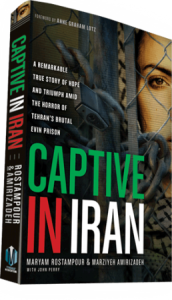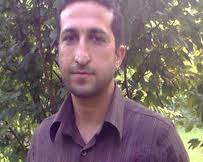
Captive in Iran, relates the story of two young women who endured detention for nearly nine months in Tehran’s Evin Prison, solely for the peaceful promotion of their religion (Photo credit: Tyndale Momentum)
Iranians often point to the fact that the first human rights charter in history came from Iran. When the Cyrus Cylinder, dating from the sixth century B.C., and owned by the British Museum, was exhibited in Iran, President Mahmoud Ahmadinejad attended the opening in Tehran. The cylinder was seen by more than one million Iranians.
The inscription on the cylinder, which has just begun its highly publicized first tour in the U.S., has been interpreted as a commemoration of Cyrus the Great’s proclamation of religious freedom and tolerance for all throughout his empire. How sad then that the current Iranian government blatantly contradicts Cyrus’ edict. Instead of honoring their ancient and noble traditions, the Iranian authorities are intensifying the pernicious and widespread persecution of Iran’s religious minorities.
Adherents of the Baha’i faith are probably the most persecuted religious community in Iran. Their faith is not recognized as a religion in Iran’s Constitution. Many Baha’is were executed in the 1980s. The seven leaders of the Baha’i community are serving 20-year prison sentences after their convictions on specious charges of “espionage for Israel,” “insulting religious sanctities” and “spreading propaganda against the system.” Baha’is are excluded from higher education and face severe discrimination in employment, their cemeteries have been desecrated, and they are not permitted to meet, to hold religious ceremonies or to practice their religion communally. Because they are excluded from universities, the community established the underground Baha’i Institute for Higher Education, but its faculty and staff have been arrested and imprisoned solely for peacefully providing instruction to their young people.
About 110 Baha’is are currently in detention in Iran, while many others are awaiting trial or have charges pending against them. One of the Baha’i prisoners of conscience is Rozita Vaseghi who is serving a ten-year prison sentence for “membership of an illegal organization whose aim is to harm the security of the country,” “propaganda against the system” and “spreading Baha’i teachings.” After she refused to sign a confession, she was told she would remain in prison “until her hair was the color of her teeth.”
Meanwhile a new book, Captive in Iran, relates the story of two young women, Maryam Rostampur and Marziyeh Amirizadeh, who converted from Islam to Christianity and who endured detention for nearly nine months in Tehran’s Evin Prison, solely for the peaceful promotion of their religion. They describe in painful detail the squalid conditions, inadequate food, long interrogations , as well as the fear and uncertainty; they were threatened by prosecutors with dire consequences – including possible death sentences for apostasy – and were pressured to repudiate their faith. Their eventual release was likely due to the intense international brought to bear on the Iranian government on their behalf.
For the last few years Iranian authorities have increasingly targeted Evangelical Protestants, many of whom are converts from Islam. The government has refused to allow the construction or licensing of any new church since the 1979 Revolution, it restricts church attendance and has closed many churches. Over 300 Christians have been arrested since 2010. Many have been sentenced to prison merely for practicing their faith. Typical Christian activities, such as evangelizing, hosting church services or bible studies, attending Christian conferences, or distributing bibles are presented as “evidence” of involvement in national security-related offenses. In January 2013, Pastor Saeed Abedini, a US-Iranian dual national, was sentenced to eight years’ imprisonment for his alleged role in “founding house churches” which the authorities deemed to constitute acts against national security.

Pastor Youcef Naderkhani
Converts may face the death penalty for “apostasy” under constitutional provisions whereby judges may refer to authoritative Islamic sources such as fatwas or religious rulings in cases where the law is silent. Pastor Youcef Naderkhani had been sentenced to death for apostasy; his conviction was overturned and he was released only after a sustained international campaign.
In addition to Baha’is and Protestants, Sufis and other religious minorities also face persecution and harassment.
The U.N. Special Rapporteur on the Situation of Human Rights in Iran, Ahmed Shaheed, devoted several paragraphs of his most recent report to the persecution of religious minorities. He urged that prisoners of conscience targeted for exercising their right to practice their religion be freed, and that Iran eliminate laws and practices that discriminate against religious minorities. Instead of engaging with the substantive findings and conclusions of the report, the Iranian government responded with their typical obfuscation and denial.
The Iranian government seems to believe it is not bound by internationally recognized standards and routinely claims that expressions of international outrage over its human rights violations are the result of a western-orchestrated conspiracy. However, universal standards are essential to protect everyone’s rights; Shi’a Muslims, who are the majority in Iran, are a minority in most predominantly Muslim countries, and themselves face harsh persecution in countries such as Saudi Arabia and Pakistan. If Iran believes it can defy international standards when it comes to its treatment of religious minorities, on what basis could it protest the mistreatment of their religious brethren in other countries?
Now that the touring Cyrus Cylinder will be suggesting to visitors around the U.S. that the ideals we hold dear were recognized long before the Enlightenment in Europe, the Iranian government should embrace and uphold the principles established by the visionary ancient king of Persia.
A brand new report on the persecution of Iran's Baha'i community from the organization Justice for Iran just came out (after I wrote this piece). You can see it at: http://justiceforiran.org/reports/bahai-report/?l…
Elise Auerbach
What is being done by Amnesty International to help Pastor Saeed Abedini? How can I help?
I don't know how they can ignore so many sources that are urging them to change their ways. I think these times will come to an end soon enough.
Pastor Saeed Abedini should be helped by Amnesty International. He is being beaten, he has internal injuries; and is not allowed to get medical help. Please help him!